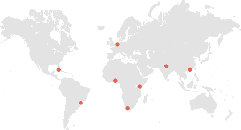The Technical University of Kenya (TU-K) was established through the elevation of The Kenya Polytechnic University College (KPUC) to full university status. TU-K was established as the first Technical University in Kenya, with the provisions of the proposed Universities Act, in 2012. The technical university is a new type of university in Kenya, whose mandate shall be to offer higher education and research in technology. The technical university, as a concept, is being created in Kenya with the objective to be a technological force behind the Vision-2030 drive and the general economic development of the nation. This has come about from the realization that most countries that have been able to make major technological breakthroughs were heavily propelled through this by their technological universities.
As an institution of higher learning, TU-K offers undergraduate degrees at the Bachelor’s level. TU-K continues to produce technologists with the objective to bridge the gap between the engineer and the technician. Traditionally the engineer (or equivalently architect, surveyor, planner, or estate manager) is trained to be concerned with the conceptualization, innovation, and design of new artifacts and systems. The technologist on the other hand is normally concerned with the actual production of artifacts and the implementation of systems. TU-K offers the degree of Bachelor of Technology (B.Tech.) for those aiming to be technologists. Parallel with this however, TU-K also offers the full professional degrees in various fields. For instance, it is intended to offer degrees such as Bachelor Engineering (B.Eng.), Bachelor of Architecture (B.Arch.), and Bachelor of Commerce (B.Com.).
Jomo Kenyatta University of Agriculture and Technology is situated in Juja, 36 kilometres North East of Nairobi, along Nairobi-Thika Highway.
It was started in 1981 as a Middle Level College (Jomo Kenyatta College of Agriculture and Technology (JKCAT)) by the Government of Kenya with the generous assistance from the Japanese Government. Plans for the establishment of JKCAT started in 1977. In early 1978, the founding father of the nation, Mzee Jomo Kenyatta donated two hundred hectares of farmland for the establishment of the college.
The first group of students were admitted on 4th May 1981. H.E. Daniel Arap Moi formally opened JKCAT on 17th March 1982. The first graduation ceremony was held in April 1984 with Diploma Certificates presented to graduates in Agricultural Engineering, Food Technology and Horticulture.
On 1st September 1988, H.E. Daniel Arap Moi, declared JKCAT a constituent College of Kenyatta University through a legal Notice, under the Kenyatta University Act (CAP 210C). The name of JKCAT officially changed to Jomo Kenyatta University College of Agriculture and Technology (JKUCAT). It was finally established as a University through the JKUAT Act, 1994 and inaugurated on 7th December 1994.



